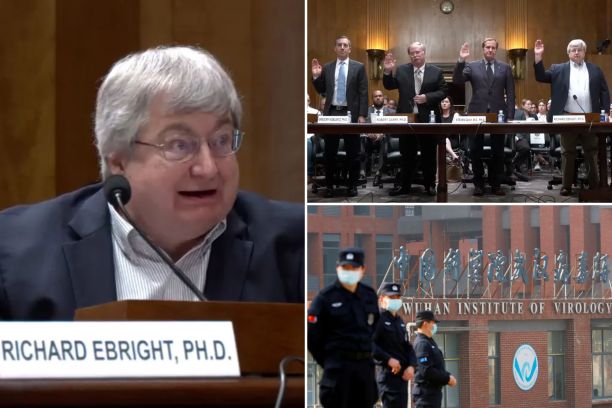Scientific Expert Declares There is ‘zero’ Evidence for Natural COVID-19 Origin; Long Covid Might Presage a Wave of Disability Claims. Get Ready, and other C-Virus related stories
Scientific expert declares there is ‘zero’ evidence for natural COVID-19 origin:
A panel of scientists fiercely debated Tuesday whether COVID-19 stemmed from a laboratory accident or naturally spread from animals to humans, with one expert declaring there was “zero” evidence for a natural origin of the pandemic that killed millions around the world.
Rutgers University molecular biologist Dr. Richard Ebright said in his opening statement before the Senate Homeland Security Committee that the “large preponderance of evidence indicates SARS-CoV-2, the virus that causes COVID, entered humans through a research incident.”
Ebright, who was joined in arguing for the so-called “lab-leak theory” by Dr. Steven Quay, a former professor at Stanford University School of Medicine, added that “no — zero — secure evidence points to COVID’s natural origins.”
“The probability this actually came from nature based on these features is one in a million,” Quay concurred.
COVID-19 emerged in Wuhan, China, more than 800 miles from “the closest bats harboring SARS-CoV-2 live viruses that could have served as progenitors,” Ebright explained.
The now-debarred Wuhan Institute of Virology (WIV), the “global epicenter of research on bat SARS viruses,” he went on, carried out US-funded, gain-of-function research on the viruses between 2014 and 2021.
During that research period, the WIV conducted “the world’s largest research program on bat SARS viruses” and had “the world’s largest collection of bat SARS viruses” — including “the virus most closely similar to SARS-CoV-2,” Ebright added
Additionally, the Rutgers prof said, the Wuhan lab obtained SARS viruses that had a “high pandemic potential” in the four years before COVID-19 — and just one year earlier, had run research that genetically modified the viruses “that match in detail the features of SARS-CoV-2.” —>READ MORE HERE
Opinion: Long covid might presage a wave of disability claims. Get ready.
Long covid is a looming potential challenge to public health and governments around the world.
Long covid, the symptoms that can linger for months or even years after infection with the pandemic virus, is still a subject of considerable uncertainty. The virus can damage the body in a multitude of ways, leading researchers to list more than 200 symptoms, and there is no single diagnostic test or cure. But even with the unknowns, evidence suggests that long covid could burden millions of people. Its effects — on individuals, but also on society at large — could be protracted and expensive.
This is the implication of two just-published studies from the National Academies of Sciences, Engineering and Medicine. The first study, published on June 5, examined the potential impairment and disability caused by long covid. The second study, published on June 11, provided a much-needed consensus definition — there have been numerous different ones previously — to help patients, doctors, researchers and policymakers work from the same page.
The new definition states that long covid is “an infection-associated chronic condition” that occurs after SARS-CoV-2 infection, “is present for at least 3 months” and is a “continuous, relapsing and remitting, or progressive disease state that affects one of more organ systems.” The definition adds that long covid can manifest itself in multiple ways, can range from mild to severe; impact children and adults; follow asymptomatic, mild or severe covid; and exacerbate preexisting health conditions.
The first study says the symptoms of long covid include: chronic fatigue, cognitive difficulties, sleep disturbances, muscle and joint pain, and “brain fog” that encompasses inattention, forgetfulness and inability to concentrate or form words. Long covid “can impact people across the life span, from children to older adults, as well as across sex, gender, racial, ethnic, and other demographic groups,” the study found. There is as yet no diagnostic test for long covid, and because pandemic viral testing was so uneven, the study suggests that a positive coronavirus test should not be the sole criterion for diagnosing long covid. New research from Washington University in St. Louis and the Veterans Affairs St. Louis Health Care system finds that patients who were hospitalized with covid are more likely to have serious health impacts several years later. —>READ MORE HERE
Follow links below to relevant/related stories and resources:
COVID KP.3 variant remains dominant in the US making up 33.1% of cases: See latest data
Should masks be here to stay?
USA TODAY: Coronavirus Updates
YAHOO NEWS: Coronavirus Live Updates
NEW YORK POST: Coronavirus The Latest
Follow links below to relevant/related stories and resources:
USA TODAY: Coronavirus Updates
YAHOO NEWS: Coronavirus Live Updates
NEW YORK POST: Coronavirus The Latest







Comments are closed.